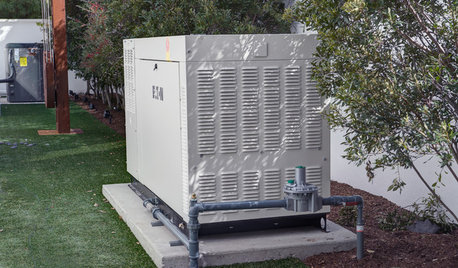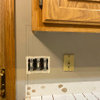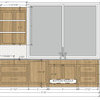Low Voltage from Portable Generator
loose_screw
12 years ago
Related Stories

SMALL SPACESHow Portability Can Make You Happier at Home
Downsizing your stuff and going for maximum mobility can actually make your home feel bigger and your life feel fuller
Full Story
DISASTER PREP & RECOVERYMore Power to You: How to Pick the Right Generator
If your home's electricity goes, don't let it take your necessities with it — keep systems running with this guide to backup power
Full Story
KITCHEN DESIGN20 Kitchen Must-Haves From Houzz Readers
We asked you to tell us your top kitchen amenities. See what popular kitchen features made the list
Full Story
MOST POPULAR15 Remodeling ‘Uh-Oh’ Moments to Learn From
The road to successful design is paved with disaster stories. What’s yours?
Full Story
REMODELING GUIDESGet What You Need From the House You Have
6 ways to rethink your house and get that extra living space you need now
Full Story
TREE HOUSESSwaying From Sleepovers to Dinner Parties in a Colorado Tree House
Folks of all ages have it made in the shade in this fun little house, thanks to electricity, a kitchenette and a rooftop deck
Full Story
ENTERTAININGHost a Laid-Back Girls’ Night in Your Own Backyard
Give the high heels a rest with a low-key, intimate gathering under the stars
Full Story
KITCHEN DESIGNKitchen Remodel Costs: 3 Budgets, 3 Kitchens
What you can expect from a kitchen remodel with a budget from $20,000 to $100,000
Full Story
HOME TECHSmall Solar: Big Home Tech Trend in the Making
New technology enables everyday household objects to power themselves by harnessing natural light
Full Story
DECORATING GUIDES10 Retro Items Ripe for a Revival
Take a trip down memory lane through a world of innovative items from the past
Full StoryMore Discussions









Ron Natalie
loose_screwOriginal Author
Related Professionals
Cibolo General Contractors · Bryn Mawr-Skyway General Contractors · Oxon Hill General Contractors · Rancho Santa Margarita General Contractors · South Windsor General Contractors · Waimalu General Contractors · Wyomissing General Contractors · Attleboro Solar Energy Systems · Benicia Solar Energy Systems · Danville Solar Energy Systems · Old Saybrook Solar Energy Systems · Quincy Solar Energy Systems · Rosamond Solar Energy Systems · Pasadena Home Automation & Home Media · St. Johns Home Automation & Home Mediaionized_gw
bus_driver
enigma_2
loose_screwOriginal Author
enigma_2
brickeyee